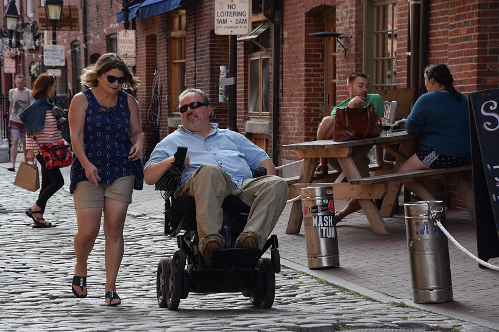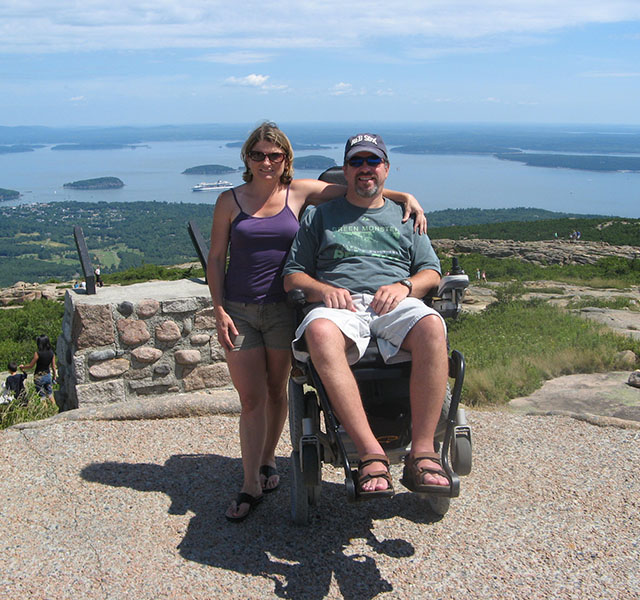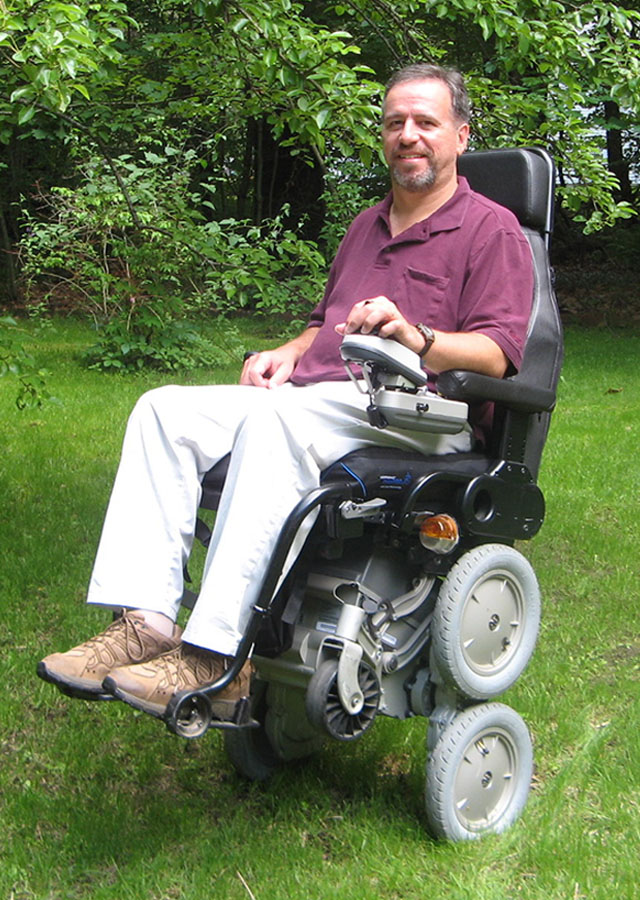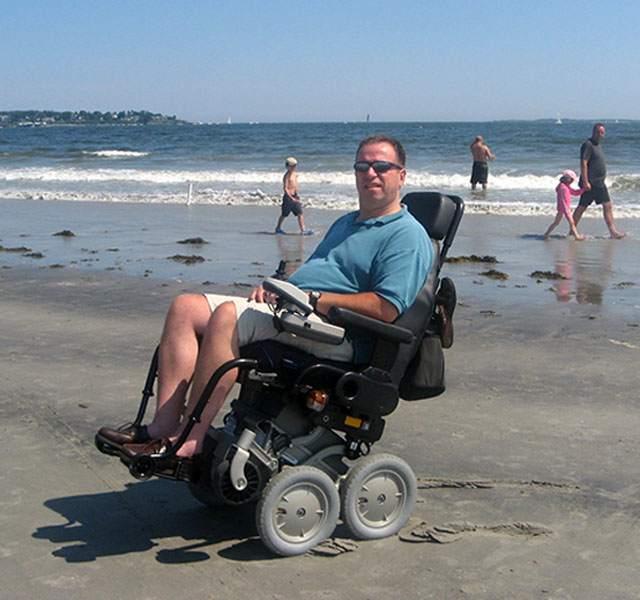MS Stories of Strength
View More Stories
Mitch, MS Advocate
Portland, ME
When somebody calls and says I’ve affected their life in a positive way—there’s not much better feeling than that. Especially knowing what people go through with this disease.
Mitch pulls up to the front of his house and begins to converse with it. “Echo: Unlock the door.” Then, through a tiny speaker near the front door, a friendly digital voice responds, “Password, please.” Mitch gives the password and, with a firm click, his front door unlocks and slowly opens. Mitch operates the joystick on his power wheelchair and rolls inside the dark and quiet house. “Echo: Living room lights on 75%.” Again, the house responds and illuminates the living room.
The empty house is a welcome sign—it presents an opportunity to get some writing done. Since being diagnosed with primary progressive multiple sclerosis (PPMS) almost two decades ago, Mitch has written extensively about his experience with the disease. His thoughtful prose has earned him clout in the patient community even as the physical act of writing has changed dramatically. He promptly pulls up to his desk, a favorite place of contemplation.
From here, Mitch has a view of the Atlantic Ocean as it meets the harbors around Portland, Maine. As the water ebbs and flows, Mitch begins to speak as clearly as possible, and the printed words materialize on the page in front of him. He uses a computer program to transcribe his words. “Writing with the program is pretty easy,” says Mitch, “but when it comes to editing, it’s clunky.” For hours, Mitch edits a new blog post, eventually mustering the drive to employ an online keyboard to type in certain words that the software keeps getting wrong. After painstakingly combing through his work, he is ready to submit it. His writing appears regularly on MultipleSclerosis.net and on his blog, EnjoyingTheRide.com, which initiated his entrance into the literary world.
When somebody calls and says I’ve affected their life in a positive way—there’s not much better feeling than that. Especially knowing what people go through with this disease.
Self-expression and Connection
 “When I started blogging in 2009, I hadn’t written creatively since high school,” recalls Mitch. With each fledgling post, Mitch garnered more positive feedback from his readers—not only members of the PPMS community, but also physically disabled individuals of every variety—and his confidence as a writer grew along with his readership. “People started to tell me I should write a book.” He did just that, and in 2018 Mitch successfully published his memoir, Enjoying the Ride, an honest and introspective look at his life—a life transformed by PPMS, but by no means lost to it. The book chronicles the progression of the disease against Mitch’s ingenuity, and unearths the roots of his fervent optimism, which he passes on to his readers as a gift.
“When I started blogging in 2009, I hadn’t written creatively since high school,” recalls Mitch. With each fledgling post, Mitch garnered more positive feedback from his readers—not only members of the PPMS community, but also physically disabled individuals of every variety—and his confidence as a writer grew along with his readership. “People started to tell me I should write a book.” He did just that, and in 2018 Mitch successfully published his memoir, Enjoying the Ride, an honest and introspective look at his life—a life transformed by PPMS, but by no means lost to it. The book chronicles the progression of the disease against Mitch’s ingenuity, and unearths the roots of his fervent optimism, which he passes on to his readers as a gift.
“The book has opened up my world,” says Mitch. “I’ve given talks at libraries and corporate retreats. So many people have written to tell me that I’ve had an effect on their lives.” The result has been deeply gratifying, completing a large, self-directed project and knowing that his story holds the power for change. “When somebody calls and says I’ve affected their life in a positive way—there’s not much better feeling than that. Especially knowing what people go through with this disease.”
Early Influences and Inspirations
Born in a rural, paper-mill town in northern Maine, Mitch spent much of his childhood exploring the woods, hunting and fishing with his father and brothers while maintaining a deep bond with his mother, Vernice, his confidant and source of emotional support. When Mitch was only five, she was in an accident that left her paralyzed from the neck down. She lived out her years as a quadriplegic and would never walk again. However, resolute in her ways as a housewife and mother to three boys, she rarely complained or asked for help. Furthermore, she, along with Mitch’s stoic father, Ted, never spoke of the circumstances of the night of her accident. The truth lurks in the background throughout Mitch’s tale, even after Vernice passed away in 2008, and inspired him to tell his story.
For Mitch, Vernice presented a model of disability, and her experiences gave him the knowledge and resilience that would serve him well later in life. As a young adult, Mitch sought out avenues to success as an upwardly mobile engineer, outdoor enthusiast, fun-loving husband, and father of two. It was at the height of his personal comfort, in his mid-30s, that the first signs of PPMS started to show.
“I’ll be the first to admit that I’ve been extremely fortunate in life,” says Mitch. “I have many advantages that others don’t—not the least of which is the woman sitting beside me.” Kim, his wife, caregiver, and best friend, has shared in many of the ups and downs of Mitch’s journey and works hard to uphold the positivity and connection to others that they both see as critical to survival. “I really take time to make sure we’re enjoying life the best we can,” she says. “Mitch has helped me in doing that. If he can be happy and make the most of life, then who am I to wallow in self-pity. I use his perspective to help me see the world through a better lens as well.”
Kim and Mitch hailed from the same small town and started dating in high school. “Within six weeks, I decided that we were getting married,” says Kim with a smile. Always the methodical planner, Kim made a point to ensure that goal was met. After a brief time away from their home state of Maine, they found themselves back near where they grew up, settling down and starting a family.
MS Challenges and Solutions
Mitch first noticed himself getting more tired than usual around the year 2000. He struggled during exercise and became unsteady on his feet, first while running, then just walking. He reported the information to his doctor and, through MRI imaging, lesions were discovered on his cervical spine. At the age of 38, he was diagnosed with PPMS. Just like his mother, Mitch suffered from an injury to the spinal cord, but unlike the blunt trauma that paralyzed her, the path ahead was gradual and uncertain. “PPMS is like being beaten with a soft pillow,” Mitch writes in Enjoying the Ride. “A thousand blows to the head and neck spread over the rest of your life. You don’t feel pain from any single wallop, but gradually your central nervous system turns to mush.”
When I lost the ability to do something that I had always been able to do, the engineer in me came to the front. Rather than lament, I got straight to problem-solving. It kept me from these emotional downswings that burden so many folks with chronic diseases.
He tried to take it all in stride. At first, Mitch did not reveal his diagnosis publicly, especially to his employers, until the disease hampered his mobility further. He reluctantly purchased a cane in 2004, then arm crutches a couple of years later. Slowly, the extent of his disability became impossible to hide—the effects of the damage to his spinal cord were becoming more and more visible. Not one to be mired in defeat, he sought different means to keep living a robust life despite his ailment.

As a professional engineer, Mitch transformed his fascination with technological innovation into a source of empowerment. In 2008, after years of steady decline in his lower body, Mitch opted to get a power wheelchair. In the process, he learned new strategies to cope with the ambulatory loss. “When I lost the ability to do something that I had always been able to do, the engineer in me came to the front,” says Mitch. “Rather than lament, I got straight to problem-solving. It kept me from these emotional downswings that burden so many folks with chronic diseases.” The solution was simple: he would buy the coolest wheelchair on Earth.
Enter the disabled techie’s dream: a power wheelchair that has the ability to handle rough, off-road terrain in four-wheel drive, can vertically align its wheels—placing the user at a standing height in balance mode, and it can climb and descend stairs safely. Mitch was an instant convert. He purchased the chair along with a used wheelchair-accessible van. Neither were cheap, but they allowed him to continue to commute to work and even fly across the country on business trips in style, impressing his colleagues, all on his own.
During this time, a fundamental shift was taking place deep inside Mitch. He moved away from the individualist notions of self-reliance he was raised around, to an understanding that he needed help and there was no shame in getting it. “I used to think that the biggest problem in our society was people gaming the system,” he reflects. “But now I think the biggest problem is people not getting the help they need.”
Assistive technology became a bridge between Mitch and the rest of the world. It also became an impetus for joy through dark times with PPMS. “When you get disabled, your world shrinks and shrinks, and pretty soon, all you can affect are the things you can reach from your chair. Technology has allowed me to keep affecting the world around me.”
I used to think that the biggest problem in our society was people gaming the system. But now I think the biggest problem is people not getting the help they need.
Life, Ever Unfolding
In recent years, PPMS has begun to affect Mitch’s upper body, rendering his arms, hands, and fingers largely immobile. He stopped driving a car in 2011—another major turning point in his journey. Since then, he has continued to counter his faltering abilities with technology and helpful friends and family. Today, he has a robotic arm to help him grab things from shelves or the floor, another one to help feed him, a lift with a ceiling track from his bed to the bathroom—and he has programmed most of these devices as well as the lights, shades, doors, and locks in his home to respond to his vocal commands.

While Mitch sings the praises of adaptive technology, it can never supplant his love for his family, friends, and the great outdoors. Since both his parents passed away, his trips to northern Maine with Kim have been few and far between, but this summer, they carefully plotted a rendezvous with eight other friends in the north country. Despite the COVID-19 pandemic hampering gatherings across the US, the friends carefully quarantined and got tested before meeting at a group of cabins on a lake.
“It was bliss,” reflects Kim. A great week unfolded in the tranquil setting. “It was like the pandemic didn’t exist,” adds Mitch. “It was one week out of the last eight months that we didn’t have to sit in front of a camera to visit with our friends.” He and Kim left all but the most essential gadgets at home and instead focused on birds, fish, trees, and amicable company. “It’s part of a balance,” says Kim. “This disease requires a lot of work. We try to make sure we don’t hit a wall.” For her and for Mitch, finding joy regardless of circumstances has become a time-honored tradition—a family value handed down from generation to generation. Together they are helping to redefine the outcomes for people living with PPMS and other degenerative diseases. In his story, Mitch the memoirist, engineer, father, and husband, has little to hide and still more to tell.